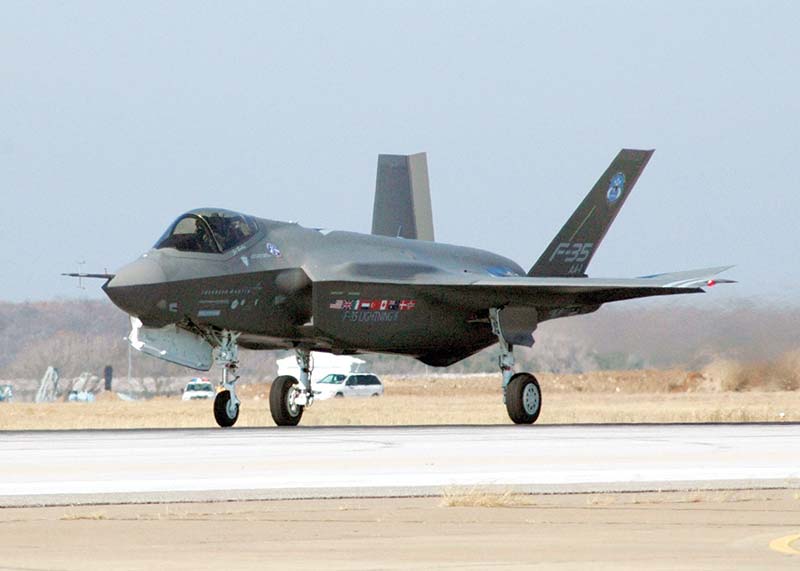 FORT WORTH, Texas: In this file US Navy handout image, an F-35 Joint Strike Fighter Lightning II, built by Lockheed Martin takes off for its first flight to test the aircraft's initial capability from the Joint Reserve Base, Fort Worth, Texas. US President Joe Biden's administration has temporarily frozen for review a massive package of F-35 jets to the United Arab Emirates and arms to Saudi Arabia, officials said on Wednesday.-AFP
FORT WORTH, Texas: In this file US Navy handout image, an F-35 Joint Strike Fighter Lightning II, built by Lockheed Martin takes off for its first flight to test the aircraft's initial capability from the Joint Reserve Base, Fort Worth, Texas. US President Joe Biden's administration has temporarily frozen for review a massive package of F-35 jets to the United Arab Emirates and arms to Saudi Arabia, officials said on Wednesday.-AFPWASHINGTON, DC: President Joe Biden's administration on Wednesday signaled a fresh look at US policy in the Middle East, announcing reviews of massive arms packages for the United Arab Emirates and Saudi Arabia as well as envisioning a slow return to diplomacy with Iran. On his first full day on the job, Secretary of State Antony Blinken said that his top priorities would include addressing the catastrophe for civilians in Yemen, where US ally Saudi Arabia has been bombarding Iranian-linked Houthi rebels.
"We've seen a campaign, led by Saudi Arabia, that has also contributed to what is by many estimates the worst humanitarian crisis in the world today, and that's saying something," Blinken told a news conference. "It's vitally important even in the midst of this crisis that we do everything we can to get humanitarian assistance to the people of Yemen, who are in desperate need," he said of the country where 80 percent of the 29 million people rely on aid to survive.
The State Department said it was temporarily pausing sales authorized by former president Donald Trump including munitions to Saudi Arabia and a $23 billion package of cutting-edge F-35 jets to the United Arab Emirates. Blinken said that a review was routine for any new administration to ensure that a sale "advances our strategic objectives." The United Arab Emirates is to be the first Arab nation to receive the versatile stealth-capable fighter-jets after it agreed to recognize Israel-a normalization that Blinken said he supports.
Yousef Al-Otaiba, the UAE ambassador to Washington, said it had anticipated the review and defended the package as "a strong deterrent to aggression"-a veiled reference to Iran. "It also enables the UAE to take on more of the regional burden for collective security, freeing US assets for other global challenges, a long-time bipartisan US priority."
Lawmakers of Biden's Democratic Party had voiced misgivings over the deal, fearing it would set off an arms race, but failed to block the sale while Trump was in office. Annelle Sheline, research fellow at the Quincy Institute for Responsible Statecraft, a Washington think tank critical of military intervention, said the review was "encouraging" and that it was a surprise that the UAE, not only Saudi Arabia, was affected. "It may reflect awareness by the Biden administration that although the UAE has conducted a skillful PR campaign, they are equally to blame for the misery in Yemen, and have in fact pursued a more aggressive foreign policy than the Saudis have, such as in Libya," she said.
Call on Iran to act first
Blinken has already pledged to end military support for the Saudi campaign and to revisit the designation of the Houthi rebels as terrorists-a last-minute move by his predecessor Mike Pompeo that aid groups say will criminalize vital work, as the insurgents are a de facto government.
One week into the job, US President Joe Biden has sent a clear warning to Beijing against any expansionist intentions in East and Southeast Asia. In multiple calls and statements, he and his top security officials have underscored support for allies Japan, South Korea, Taiwan and the Philippines, signalling Washington's rejection of China's disputed territorial claims in those areas.
On Wednesday, Biden told Japanese Prime Minister Yoshihide Suga that his administration is committed to defending Japan, including the Senkaku Islands, which are claimed both by Japan and China, which calls them the Diaoyu Islands. That stance was echoed by Defense Secretary Lloyd Austin, who told Japanese counterpart Nobuo Kishi on Saturday that the contested islands were covered by the US-Japan Security Treaty.
Austin affirmed that the United States "remains opposed to any unilateral attempts to change the status quo in the East China Sea," according to a Pentagon statement on the call. Meanwhile, three days into the Biden administration, State Department spokesman Ned Price warned China about menacing Taiwan after it repeatedly sent more than a dozen military fighters and bombers through the island's air defense zone. "We will stand with friends and allies to advance our shared prosperity security and values in the Indo-Pacific region-and that includes deepening our ties with Democratic Taiwan," Price said in a statement.
"Our commitment to Taiwan is rock-solid." And Secretary of State Antony Blinken told his Philippine counterpart on Wednesday that a mutual defense treaty obliging the US to defend the Philippines against attack in the Pacific also applied to the disputed South China Sea -- -- something the Obama administration did not specify. Those comments and others sought to emphasize that the new Biden administration will not deviate from the firm security stance towards China that it inherited from ex-president Donald Trump. - AFP










